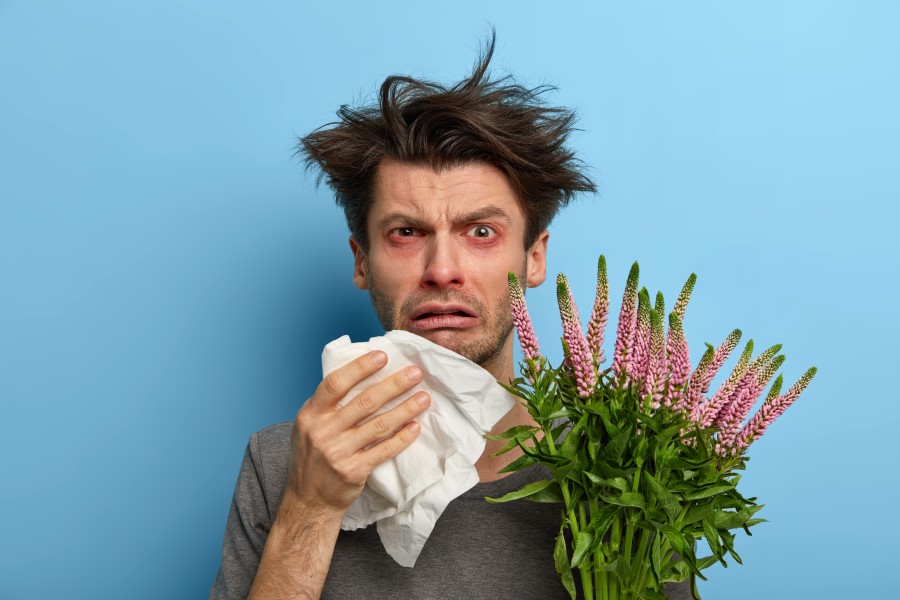Hay fever, also known as allergic rhinitis, is a common condition that affects millions of people each year, especially during spring and fall. It occurs when your immune system reacts to airborne substances such as pollen, dust mites, or mold spores. These triggers cause inflammation in the nasal passages, leading to unpleasant symptoms. Understanding hay fever symptoms and exploring effective hay fever treatment options can help you manage discomfort and enjoy the changing seasons without constant sneezing and congestion.

Understanding Hay Fever and Its Causes
Hay fever is primarily triggered by an allergic reaction to pollen, a fine powder released by plants, trees, and grasses. When someone with a pollen allergy inhales these particles, their immune system mistakes them for harmful invaders and releases histamines. This response leads to symptoms like sneezing, runny or blocked nose, itchy eyes, and throat irritation.
There are two types of hay fever:
- Seasonal Allergic Rhinitis: Caused by pollen from trees, grasses, or weeds that is present during specific seasons.
- Perennial Allergic Rhinitis: Triggered by year-round allergens such as pet dander, dust mites, or mold.
Common Hay Fever Symptoms
Recognizing hay fever symptoms is the first step toward effective management. Common signs include:
- Continuous sneezing
- Nasal congestion or a runny nose
- Itchy or watery eyes
- Scratchy throat or coughing
- Fatigue due to poor sleep
While seasonal allergies can be mild for some, others experience severe symptoms that interfere with daily activities.
Top Remedies for Hay Fever Relief
Managing hay fever involves a combination of lifestyle changes, over-the-counter (OTC) medications, and natural remedies. Here are some of the best ways to control hay fever symptoms:
1. Avoid Allergen Exposure
The most effective hay fever treatment begins with minimizing contact with allergens.
- Stay indoors during high pollen counts, especially in the early morning and late evening.
- Keep windows closed during pollen season and use air purifiers.
- Shower and change clothes after spending time outdoors to remove pollen.
2. Use Antihistamines
OTC antihistamines like cetirizine, loratadine, or fexofenadine can relieve sneezing, itching, and runny nose. They block the histamine reaction in your body, reducing inflammation and irritation.
3. Try Nasal Sprays
Steroid nasal sprays are among the most effective hay fever treatments for controlling nasal inflammation. Regular use can ease congestion, sneezing, and sinus pressure.
4. Keep Indoor Air Clean
Use HEPA filters and keep humidity levels low to reduce allergens like dust mites and mold. Regular cleaning also helps minimize triggers of allergic rhinitis.
5. Consider Natural Remedies
- Saline Nasal Rinses: Flush out allergens from your nasal passages.
- Honey: Local honey may help your body adapt to local pollen exposure over time.
- Vitamin C: Acts as a natural antihistamine and boosts your immune system.
6. Immunotherapy (Allergy Shots or Tablets)
If your hay fever symptoms are persistent and resistant to standard treatments, allergy shots or sublingual tablets may be recommended. This long-term solution helps your body gradually build tolerance to allergens.
When to See a Doctor
If your hay fever treatment methods are not effective, or your symptoms worsen, consult a healthcare professional. Persistent allergic rhinitis can lead to complications like sinus infections, ear infections, or even asthma flare-ups.
Final Thoughts
Hay fever can be frustrating, but with the right prevention and hay fever treatment strategies, you can control seasonal allergies and reduce discomfort. Whether through medication, lifestyle adjustments, or natural remedies, consistent care can make a significant difference. If your symptoms persist, consulting an allergy specialist ensures you get a personalized plan to manage pollen allergy and enjoy each season symptom-free.
Frequently Asked Questions (FAQs)
Q1. What causes hay fever?
Hay fever is caused by an allergic reaction to airborne allergens like pollen, dust mites, or mold spores. Your immune system overreacts, releasing histamines that cause inflammation and irritation.
Q2. How long does hay fever last?
The duration depends on your triggers. Seasonal allergies typically last for several weeks during pollen seasons, while perennial allergic rhinitis can persist year-round.
Q3. Can hay fever be cured completely?
There is no permanent cure for hay fever, but treatments like antihistamines, nasal sprays, and immunotherapy can significantly reduce symptoms and improve quality of life.
Q4. What foods help with hay fever?
Foods rich in vitamin C, omega-3 fatty acids, and quercetin (like citrus fruits, berries, and leafy greens) may reduce inflammation and allergic responses.
Q5. Is hay fever the same as a cold?
No. While symptoms may overlap, hay fever is caused by allergens, not viruses. Unlike a cold, hay fever symptoms last longer and are seasonal or chronic.
Don’t let hay fever hold you back—get lasting relief! Visit our website https://sccodessa.com/services/allergy/ or call us at +1 (432) 322-8676 to schedule your consultation.
